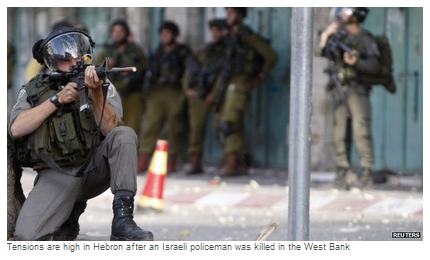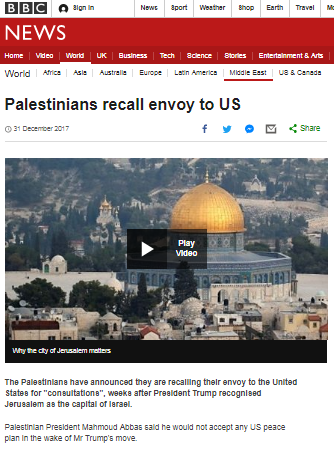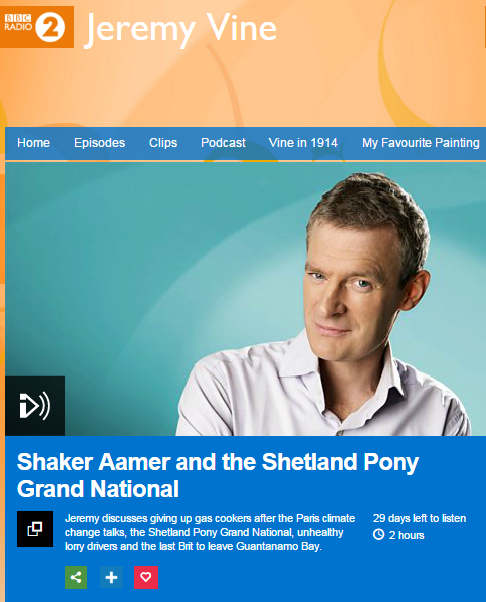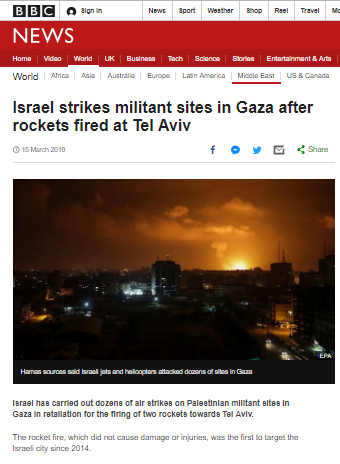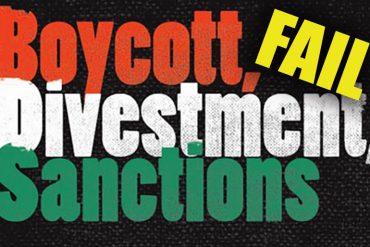Over twenty-eight hours after the April 14th terror attack on Route 35 in which father of five Chief Superintendent Baruch Mizrachi was murdered and his wife and son injured, the BBC finally managed to come up with a brief mention of the incident, buried at the bottom of an article titled “Israelis and Palestinians in bid to extend peace talks” which appeared on the BBC News website’s Middle East page on the night of April 15th.
The article was illustrated using the misleading photograph below (which appeared at the top of the report’s original version and was moved further down about 12 hours after its initial publication, only to be removed completely in an even later version of the report) which reasonable readers would interpret as intending to inform them of some sort of clashes between Israeli security forces and Palestinians.
The photograph’s equally misleading caption reads:
“Tensions are high in Hebron after an Israeli policeman was killed in the West Bank”
That choice of wording reinforces the mistaken impression already given to BBC audiences by the photograph that the said policeman was killed in the line of duty rather than in a terror attack against him and his family.
In the original article’s final paragraph the BBC managed to come up with the following thirty-four words to describe the incident, with notable use of the politically partial term “occupied West Bank”:
“Israel is also angry at the killing of an off-duty Israeli policeman in the occupied West Bank on Monday on the eve of the Passover Jewish holiday. The officer’s wife and child were wounded.”
The fact that this was a terror attack in which a Palestinian terrorist deliberately targeted random Israelis travelling along a major road is concealed from readers, along with the actual circumstances of the incident – details of which were amply available by the time the BBC got round to composing this report.
“The senior Israeli police officer was killed while driving to Hebron to celebrate Passover with his wife’s family. His pregnant wife, Hadas, was moderately injured in the attack and was transferred to Shaare Tzedek Medical Center in Jerusalem for treatment. The couple’s five children spent the holiday with their relatives as planned, and on Monday night were informed by their mother of their father’s death.
Hadas Mizrahi told the Ynet news website that while driving, her husband had seen the terrorist and cried “They’re shooting, they’re shooting, there’s a terrorist.” After her husband was shot, she took the wheel, drove out of sight, and alerted the authorities.
“I covered my blood with a rag,” Hadas, who was shot twice and broke a rib, said. “I saw that Baruch was dead. When the soldiers arrived I told them ‘Bandage me and take the children to the armored vehicle, so that they don’t see their father lying [there] dead.’ “
In the version of the report after amendment some 12 hours later, those thirty-four words became forty-one with the appearance of “a gunman”, an apparent realisation of the inappropriateness of the use of the term “occupied West Bank” by a supposedly impartial news organisation and a misleading new location for the incident which actually took place near the village of Idhna.
“Israel is also angry at the killing of an off-duty Israeli policeman by a gunman in the West Bank on Monday, on the eve of the Jewish holiday of Passover. His wife and child were wounded in the attack outside Hebron.”
In the even later version of the report, that paragraph was changed slightly yet again:
“Tensions were raised on Monday when an off-duty Israeli policeman was killed by a gunman in the West Bank, on the eve of the Jewish holiday of Passover. His wife and child were wounded in the attack outside Hebron.”
In the report’s first two versions, audiences were not informed of the fact that no condemnation of the attack came from the Palestinian Authority until two days afterwards or of the celebratory announcements issued by Hamas and the Palestinian Islamic Jihad. The report’s later version promotes the statement made in condemnation of the attack by the PA Minister for religious affairs, but fails to inform audiences that the same minister praised convicted terrorists just two weeks previously.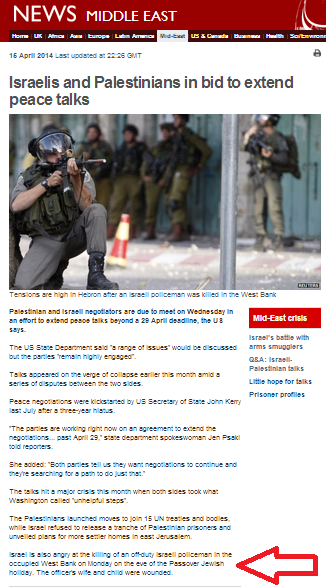
Additionally, the article continues to mislead BBC audiences with regard to the current impasse in the talks between Israel and the PLO, with the original version having stated:
“The talks hit a major crisis this month when both sides took what Washington called “unhelpful steps”.
The Palestinians launched moves to join 15 UN treaties and bodies, while Israel refused to release a tranche of Palestinian prisoners and unveiled plans for more settler homes in east Jerusalem.”
In the later version those paragraphs were altered to read as follows:
“The direct talks, which resumed last July, appeared on the verge of collapse earlier this month when both sides took what the US called “unhelpful steps”.
The Palestinians submitted applications to join 15 UN treaties and conventions, while Israel refused to release a fourth group of 26 long-term Palestinian prisoners and reissued tenders for more than 700 new homes at a Jewish settlement in occupied East Jerusalem.”
Whilst in fact there is no clause in the agreement which was the precursor to this round of talks which limits Israeli construction of what it chooses to term “settler homes” (thereby pinning clearly political colours to its supposedly impartial mast), the BBC continues – as has been the case in its last two reports on the subject – to imply to audiences that the reissuing of building tenders first publicized six months ago for housing in a Jerusalem neighbourhood which, according to any realistic scenario will remain under Israeli control in any final status agreement, was somehow a contributing straw to the breaking of the camel’s back.
Notably too, Israel is inaccurately described as having “refused” to release the fourth and final tranche of Palestinian prisoners whereas in fact the release was actually delayed until the PA made its unilateral bid to join UN agencies: a move which was in breach of the agreement from last July which kick-started the current round of negotiations.
The organization which cynically claims to aspire to “remain the standard-setter for international journalism” continues to lower the bar in order to reduce those ‘standards’ to the deliberate misleading of audiences and the whitewashing of Palestinian terrorism. Hence, it is worth reminding ourselves of the wording of the opening sentence of the BBC’s own guidelines on the subject of reporting terrorism:
“We must report acts of terror quickly, accurately, fully and responsibly.”
None of those four conditions was met in the BBC’s reporting of the Route 35 terror attack.

